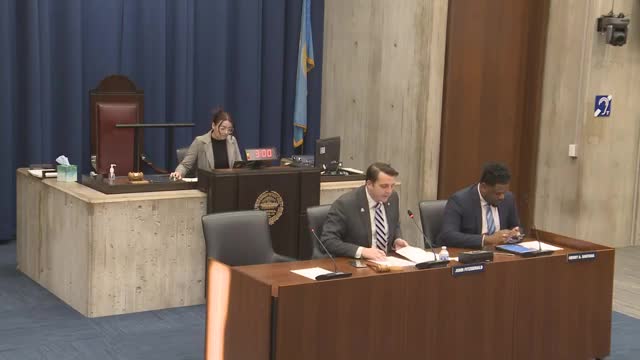City council committee reviews $362,809 in state mental‑health grants to fund BPD CIT training and co‑response supports
Get AI-powered insights, summaries, and transcripts
Subscribe
Summary
A Boston City Council joint committee heard from Boston Police Department officials about three Massachusetts Department of Mental Health grants — $262,809.86 for CIT TTAC training, $80,000 for a co‑response peer/recovery position, and $20,000 for training backfill — and probed training reach, metrics and sustainability ahead of a planned vote at the next council meeting.
The Boston City Council’s joint committee on Public Health, Homelessness and Recovery and Public Safety and Criminal Justice heard testimony on Nov. 18 about three state grants totaling $362,809.86 to support crisis‑intervention and co‑response work in the Boston Police Department.
Chair John Fitzgerald said the grants — Docket 1346 for $262,809.86, Docket 1661 for $80,000 and Docket 1662 for $20,000 — come from the Massachusetts Department of Mental Health and are intended to fund a 40‑hour Crisis Intervention Team (CIT) training program, a full‑time recovery/peer specialist position through BEST, and overtime/backfill so officers can attend training. The grants were sponsored by Mayor Michelle Wu and will be administered by the Boston Police Department if accepted by the council.
Jenna Savage, deputy director of the Boston Police Department’s Office of Research and Development, told the committee the CIT TTAC grant pays for a civilian CIT training coordinator, training locations, professional actors for scenario work, and other supplies needed to run a 40‑hour, multi‑module curriculum. "We now, there's actually a 40 hour CIT training," Savage said. She described modules on de‑escalation, substance use, suicide prevention, elders and veterans and said BEST clinicians co‑teach many sessions to make the training Boston‑specific.
Lieutenant Peter Messina, commander of the Street Outreach Unit, said the grants "have been absolutely critical" and that the department has trained roughly 270 officers to date. "We have been able to train upwards to 270 officers to date and we have a lot of interested officers who are looking to attend this training," he said.
Councilors pressed administration staff on several operational points. Counsel Henry Santana asked whether training is mandatory and how success is measured; Savage said training is voluntary and officers self‑identify as CIT‑trained in dispatch systems, and both Savage and Messina said quantitative impacts are difficult to isolate. "One measure of success would be just regular use of force incidents in the city," Messina said; Savage added the department collects daily trainee surveys and that the co‑response clinicians maintain annual metrics (Savage said she had submitted FY25 co‑response data to City Hall and offered to provide the report).
Councilor Kelly Zapata asked about program history and local impacts; Savage said co‑response grants date to about 2010 and the local CIT TTAC training began around 2021. When asked about the $80,000 recovery coach, Savage said that peer specialist positions have been used to staff hub tables and assist officers in the field but that the specific position has been difficult to fill since the previous employee, Kelly Young, left.
On recertification and sustainability, Savage said DMH’s CIT TTAC designation requires meeting national training templates but allows Boston to tailor content; the department is planning a three‑year recertification with a one‑day refresher and would use grant funds to support recertification. She also cautioned that federal grant opportunities have tightened and DMH budgets are under pressure, but said the city has generally continued to receive DMH awards.
Committee members also asked about services for veterans and officer supports. Savage and Messina said the CIT curriculum includes a veterans module and that hub tables exist in neighborhoods including East Boston, Jamaica Plain, Roxbury and Dorchester to coordinate multidisciplinary responses. Messina described the BPD peer support unit and said command encourages officers to use available supports.
The committee did not vote during the hearing. Chair Fitzgerald closed the session after confirming there was no public testimony and said the committee aims to consider the grants for a vote at the next council meeting.
For additional information, committee members were offered the FY25 co‑response report and training slides Savage referenced; the department said it would provide those documents on request.
